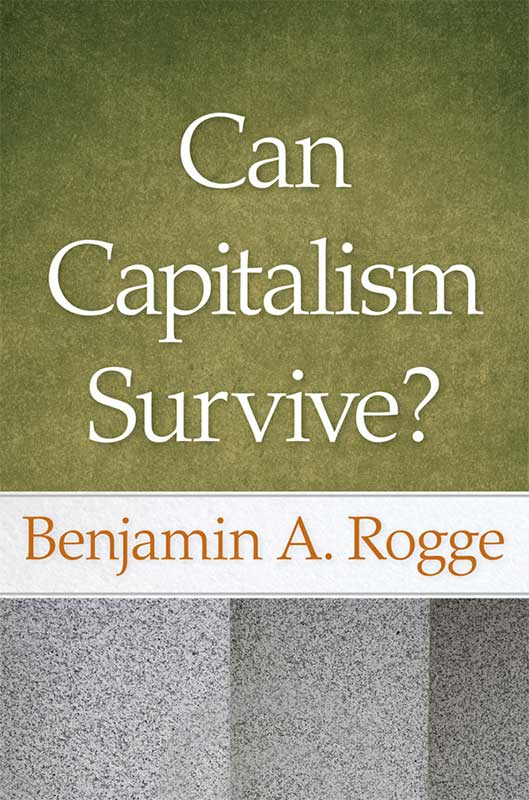Can Capitalism Survive?
By Benjamin A. Rogge
One of the signs of advancing age in the American college professor is a tendency for him to write less and publish more. This seeming paradox is easily explained by the phenomenon of
Collected Works, that is, by what on television would be described as reruns. As in television, no great public outcry is needed to bring forth the reruns; a question from his wife, a polite suggestion from a colleague, and the cut-and-paste operation is under way.I have put together here what I believe to be the best of the rather meager output of my professional career up to this point. For reasons (mostly financial) that always seemed adequate at the moment, I have been more of a speechmaker than a writer. Thus, you will find that many of the pieces in this collection are but speeches put down on paper…. [From the Foreword]
First Pub. Date
1979
Publisher
Indianapolis, IN: Liberty Fund, Inc. Liberty Fund, Inc.
Pub. Date
1979
Comments
Collected essays.
Copyright
The text of this edition is under copyright. Picture of Benjamin Rogge: file photo, courtesy of Liberty Fund, Inc.
- Foreword
- Part I, Introduction
- Part I, Chapter 1, Can Capitalism Survive
- Part II, Introduction
- Part II, Chapter 1, The Case for Economic Freedom
- Part II, Chapter 2, The Libertarian Philosophy
- Part II, Chapter 3, Who is to Blame
- Part II, Chapter 4, Paradise in Posey County
- Part III, Introduction
- Part III, Chapter 1, Adam Smith, 1776-1976
- Part III, Chapter 2, Christian Economics: Myth or Reality
- Part III, Chapter 3, College Economics: Is It Subversive of Capitalism
- Part IV, Introduction
- Part IV, Chapter 1, Profits
- Part IV, Chapter 2, The Businessman
- Part V, Introduction
- Part V, Chapter 1, The Labor Monopoly
- Part VI, Introduction
- Part VI, Chapter 1, The Long-Run Economic Outlook
- Part VI, Chapter 2, Alleged Causes of Inflation, Corporate Monopolies
- Part VII, Introduction
- Part VII, Chapter 1, The Problems of Cities
- Part VIII, Introduction
- Part VIII, Chapter 1, Financing Higher Education in the United States
- Part VIII, Chapter 2, The Promise of the College
- Part IX, Introduction
- Part IX, Chapter 1, The Businessman and the Defense of Capitalism
- Part IX, Chapter 2, Reflections on the Election of 1964
- Part IX, Chapter 3, The Foundation for Economic Education, Success or Failure
Part IX, Chapter 2
Reflections on the Election of 1964
By the time this is in print, the election will be over and conservatism as a potent political force will be dead. A fine man will have suffered a humiliating defeat, and the liberals in his party will be planning a ruthless purge of all those who were closely associated with his candidacy. The stage will have been set for the specter of the “Goldwater debacle” to haunt the candidacy of every conservative for years to come.
coup. Goldwater’s own clear, good sense in thinking that the time was not ripe and that he could serve the cause better by continuing as senator from Arizona was overpowered by the passion of the leaders of the Draft Goldwater group and by their assurance that they had the know-how to get the job done.
*100
*101 Certainly the philosophical and political success of the ideas he presented in the book in which these words appear would attest to the significance of timing in attempts at radical change.
The country was simply not yet prepared to accept the conservative position. Goldwater’s campaign could not build on any solid foundation of widely accepted ideas on society, economics, and the state.
*102 But the people were not ready to reduce the power of government, and Goldwater and his advisors had no place else to go. The basic argument over principles had to be abandoned because most of the people weren’t ready to accept the Goldwater principles. When the debate turned to who could do better what we’re now doing, the man in the saddle in a period of relative prosperity had a crushing advantage.
the real function of conservatism in America is not to try to win elections but to try to win converts. The real battle is, as always, a battle of ideas.
both parties that it will make little difference which one wins.
The Wealth of Nations (New York: Modern Library, 1937), p. 423.
The General Theory of Employment, Interest, and Money (New York: Harcourt Brace, 1936), p. 383.
Human Action (Chicago: Henry Regnery Co., 1963), p. 864.
Capitalism, Socialism, and Democracy, 3rd ed. (New York: Harper & Row, 1962), pp. 144, 137.
Walden and Other Writings (New York: Modern Library), p. 645.
National Review, August 11, 1964, pp. 683-86.
The General Theory of Employment, Interest and Money (New York: Harcourt, Brace, 1936), p. 383.
The Road to Serfdom (Chicago: University of Chicago Press, 1944), particularly the chapter on “Why the Worst Rise to the Top.”
War and Peace, Inner Sanctum ed., p. 193.
The Public Interest, Fall 1970, p. 74.

